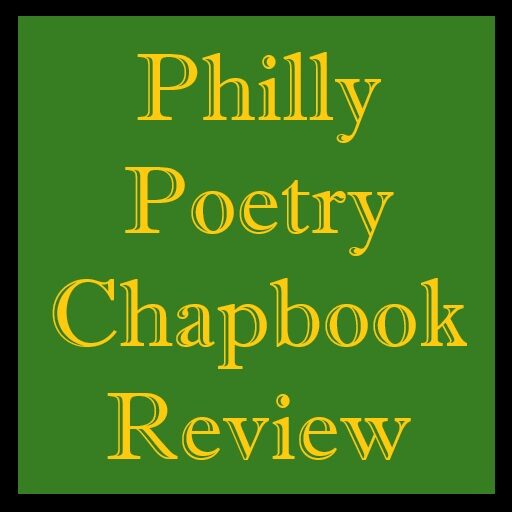Due to difficulties in obtaining information in advance of chapbook releases, chapbook listings will be published at the end of each month, beginning with Issue 3 (May/June 2024). This post contains information about poetry chapbooks that we know about published during May, 2024.
Information, including product descriptions, is provided by the publisher and not a critical judgment. If we cover the book on this site, links will be included.
Bottlecap Press
Thanatophobia, Amber Moss
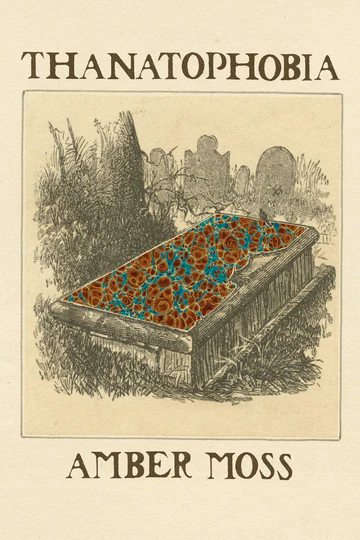
Thanatophobia explores the complex intersection of mortality, spirituality, identity, and trauma through a series of poignant poems that delve into the depths of human experience. From prayers whispered in desperation to the haunting echoes of stillborn dreams, each poem in this chapbook offers a raw and introspective look at the fear of death and the search for meaning in the face of adversity.
Thanatophobia is a haunting and evocative exploration of the human condition, offering readers a glimpse into the depths of fear, longing, and hope that define our shared humanity. Through its powerful imagery and lyrical prose, the chapbook invites readers to confront their own fears and uncertainties, while also finding solace in the enduring power of faith, resilience, and connection.
Post-Eclipse: A Queer Home, Jo Christian
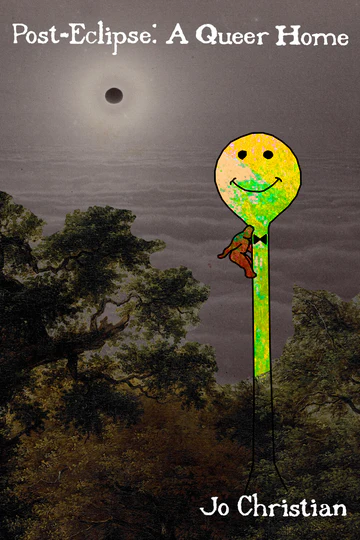
Written from the heart of Southern Illinois, at the eclipse crossroads of America, following the second path of totality directly through the town of Carbondale, the chapbook Post-Eclipse: A Queer Home creates a mythos and gender-queer, cryptid journey from hiding in the dense, closeted woods of Shawnee National Forest to the top of the world, seeing the folk legend of the Big Muddy Monster waiting for their companion, atop the smiling face of the Makanda water tower.
In the end, you find yourself entrenched in the strange, mystical world that is Southern Illinois, its myths and ways of relating to itself. You find yourself challenged by the queer possibility of understanding the divine, the world, and even a pile of dead skins cells on wooded floors as belonging. And just like other queer community members, writers, artists, and the neurodivergent, we find ourselves oddly at home in the strangeness of it all, home and in love with our place in it all.
Fathom, Sophie Morelli
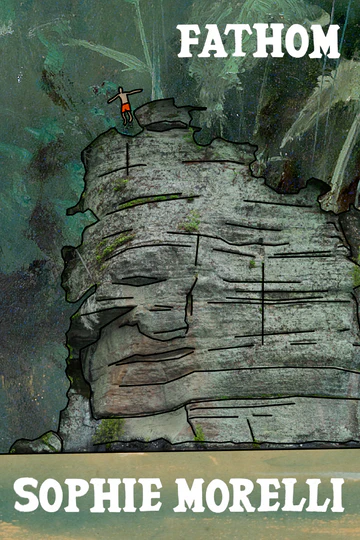
This collection of poems is based on Lake Placid, New York’s most well-known ghost story. In 1933, the Lady in the Lake, whose real name was Mabel Smith Douglass, took a row boat across Lake Placid and never returned. Thirty years later, almost to the day, local divers discovered her body perfectly preserved one hundred feet below the surface of the water. Her spirit has been known to haunt the famed Pulpit Rock, where her body was found.
These poems are about not only Mabel Smith Douglass’s death but also her life, her tumult—about the family that broke apart before her eyes and slowly crumbled like silt to the bottom of the sea—and how she lived through it. Poems about Mabel are interspersed with poems about the author’s own struggles with grief, relationships, and her deep, near-obsessive love of the town where she grew up.
There is so much more to this woman’s story than the way that she died. The author hopes you’ll feel closer to Mabel Smith Douglass, the Lady in the Lake, just as she does.
The Concrete Jungle and the Surrounding Areas, Daniel Damiano
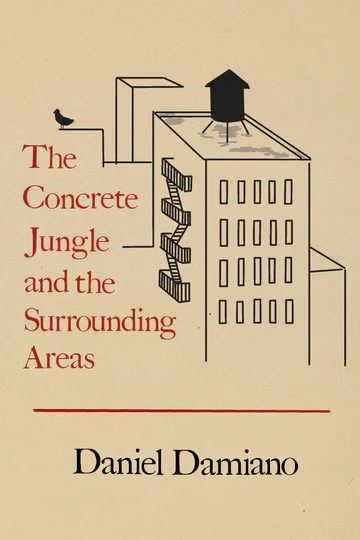
The Concrete Jungle and the Surrounding Areas contains both observational and personal poems from humorous and, at times, moving vantage points by Pushcart-Award nominated Poet Daniel Damiano. Some take aim at the unflinching reality of life in a formidable city, while others go further back to Damiano’s adolescent past. Within that span, the collection moves seamlessly from transportive odes on the absurdities of life, aging, childhood, survival, along with affectionate homages to the wildlife of the city. Some are about birds. One is about a moth. One is about two feral cats. And most contain the undeniable backdrop of New York City.
Intersecting Orbits, Nancy K. Jentsch
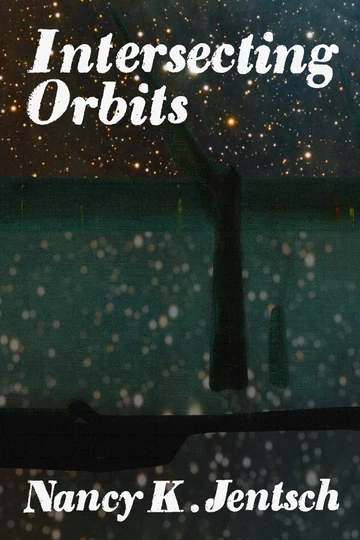
In Intersecting Orbits, the author’s sense of awe is never in question. In fact, the poems in this chapbook often catch her looking up at the sky, be it in wonder or in supplication.
In 2020, with no Smartphone in hand and a grandchild on the way, Nancy K. Jentsch began writing poems to capture what can’t be seen through a camera lens, but is just as worthy of being remembered as photos kept in an album. These snapshot poems, seven-line poems of seven syllables each, document the beginning of her journey with her first grandchild.
Twelve of these poems are included in Intersecting Orbits where they are complemented by related poems that comment on Jentsch’s experience of rural life, a life that knows not only breath-taking sunsets and lush meadows but also rainy days and even the memory of a childhood snakebite.
Palimpsest, Courtney Heidorn
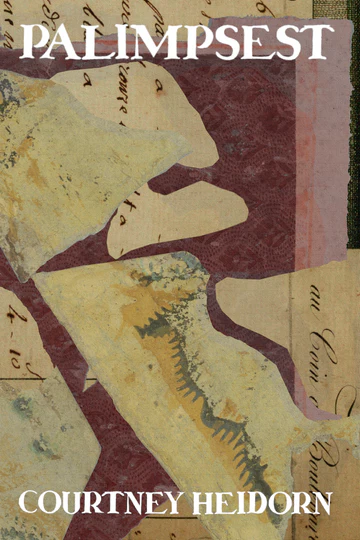
Oxford Languages defines a palimpsest as “something reused or altered but still bearing visible traces of its earlier form.” Palimpsest follows the path from girlhood to maturity, yet still bears youth’s early scars in every utterance.
The poems in Courtney Heidorn’s debut chapbook begin with the giddiness of a first sapphic love: unexplainable desire, and, inevitably, heartbreak. The reader will track the invaluable knowledge learned from love’s devotion but will quickly feel the growing pains of womanhood. The throughline in Palimpsest is heartbreak—a special nuance of grief. These poems prove that heartbreak is not just romantic. It is familial, maternal, personal, and, if the reader lets it be, therapeutic.
Palimpsest is adolescence outstretched: tangible evidence of the edits and revisions one has to make in the face of grief. It is innocence in love turned inward; it is learning to mother oneself.
AMERICAN DREAMLAND, Kirby Michael Wright
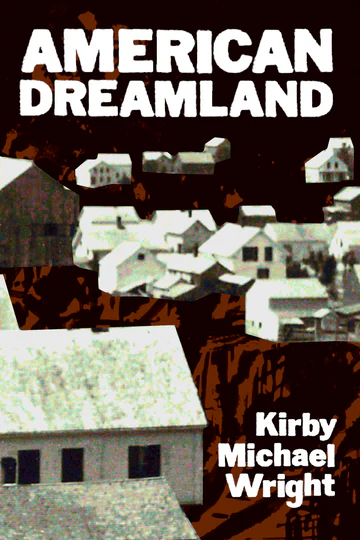
The poet takes a battle ax to the standard American Dream perception that living in the suburbs is nirvana, or at least a safe zone inhabited by dwellers sharing their color, class, and political leanings. Wright rebels against the status quo of middle-class neighborhoods, especially the dull patterns of existence that spin suburbanites toward homogenization. He sees a link between the day-to-day acceptance of routine and living in communities of lookalike homes.
Wright is also concerned about women relying on traditional roles to define their duties in society and in their relationships. He seeks to level the playing field by calling attention to the traps women often encounter, including fears of divorce, estrangement from neighbors, upsetting children, and going through life alone. If anything, he wants to shake up his readers through dark humor and blunt observations to reveal aspects of their lives they wouldn’t ordinarily be aware of or have placed on back burners.
The Trim of Wind’s Dress, Sierra Earle
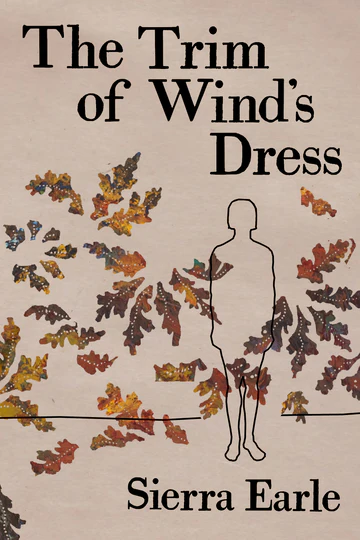
Like the sound of the wind, Sierra Earle’s debut chapbook, The Trim of Wind’s Dress, howls with tragic poetics. These 14 poems question the aesthetics of their surroundings to arrive at dynamic truths. Sierra Earle explores identity, grief, whimsy, and more on airborne bodies through an abundance of lucid images. The Trim of Wind’s Dress is for the deep feeling and passionate; the dreamers brave enough to confront the dark. This collection wafts, blows, swoops, squalls, pansexual themes of boundless love and loss.
In this animistic collection, snow turns to rock, trees transmute into death, trauma bequeaths intimate self-knowledge, and all are full of life. While the wind leaves the tangible raw and barren, it gifts a vulnerable container for soulful self-reflection. Yet, The Trim of Wind’s Dress also homes the beauty of the human need.
Gathering Stars, Sophia Ballard
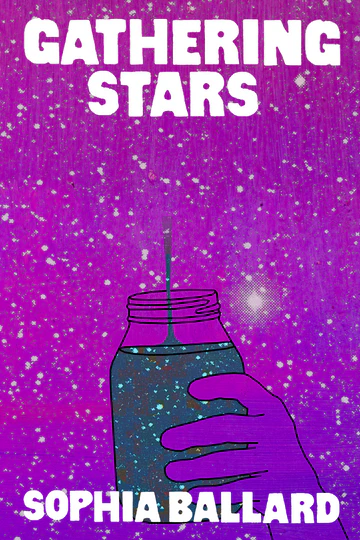
Gathering Stars explores feminist and individualistic themes throughout a series of free verse poems. This chapbook includes forms such as the golden shovel poem and the ars poetica. However, even within these forms, the poetry seeks to emphasize the “free” in free verse. These poems are, in and of themselves, an expression of individuality.
As the title suggests, stars are the primary thematic imagery. However, this collection also draws inspiration from the European and North American witch hunts to explore feminist themes and the importance of individuality. Each poem in this collection both stands on its own and weaves into the larger narrative presented.
Shuffle Play, Jill Michelle
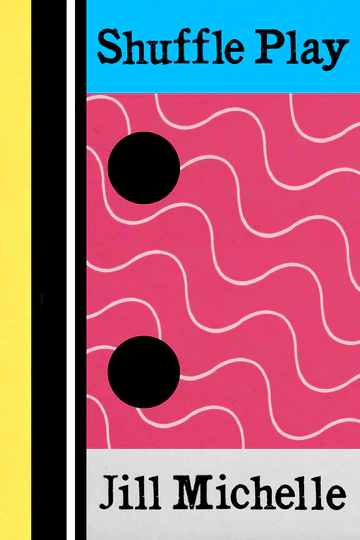
In the choose-your-own-poem chapbook, Shuffle Play, Jill Michelle invites readers to transport themselves in creative ways through this collection of song-inspired, narrative pieces. Shuffle Play’s assorted poems explore themes of coming-of-age, sexual assault/PTSD, motherhood, love, loss and grief. The works here, examining both everyday moments and historical events like 9/11 and the COVID-19 pandemic, are composed in both free and formal verse with acrostic, ghazal, sonnet and tanka/waka forms represented.
Musical artists whose songs inspired the poems in Shuffle Play include Beck, Pat Benatar, The Clash, The Doors, Bob Dylan, Fruit Bats, Ben Harper, The Hold Steady, Billie Holiday, The J. Geils Band, The Modern Lovers, Modest Mouse, Nirvana, No Doubt, Tom Petty and the Heartbreakers, Pixies, Radiohead, Rage Against the Machine, R.E.M., Sandy Rogers, The Shins, Simon & Garfunkel, Stealers Wheel, The Vaselines, Violent Femmes, The White Stripes and Wilco.
The Last Lullaby, Rebecca Dietrich
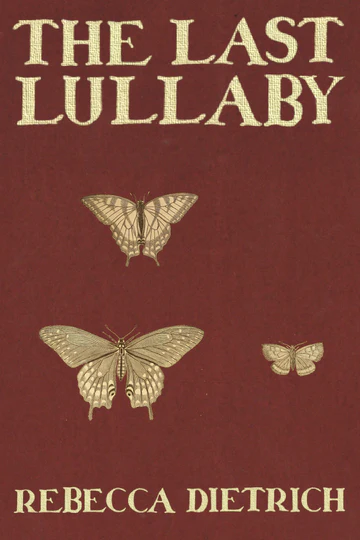
In The Last Lullaby, Rebecca Dietrich weaves a tapestry of heartfelt poems that explore the depths of human suffering, resilience, and the relentless quest for justice. This powerful collection delves into the myriad facets of loss, from the personal to the cultural and environmental. The opening poem, “Taken,” portrays the anguish of a mother whose daughter has vanished, symbolizing the broader trauma of colonization and cultural erasure. Throughout the collection, themes of relentless struggle and the cyclical nature of war, as depicted in “Futility,” echo the devastating impact on families and nations.
Through powerful verses, Dietrich weaves narratives of children lost to conflict, environmental catastrophe, and societal neglect. “Futility” portrays the endless cycle of war, leaving families shattered and nations in ruins, while “Collapse” paints a grim picture of a world on the brink of ecological disaster, emphasizing the dire consequences for future generations. Poems like “Paloma” offer tender reflections on the dreams and hopes for unborn children, and “Daughters” addresses the inherited burdens and struggles faced by young girls in a world rife with inequality. The titular poem, “The Last Lullaby,” encapsulates the collection’s essence, blending themes of sorrow and enduring hope, suggesting that even in the face of unimaginable loss, a bittersweet melody persists. The Last Lullaby is a poignant exploration of the depths of human grief and the enduring strength found in the memories of lost children.
His Boyfriend Materials, Stephen Yuffrida Brown

His Boyfriend Materials is the debut chapbook by Stephen Yuffrida Brown. It is a brief exploration into the validity and nuance of temporary connection, particularly in the context of queer romance and hookup culture. Navigating seduction, tenderness, outrage, and loneliness, it clings to a lingering optimism. Rather than the classic hope left behind in Pandora’s box, however, this takes the form of the sudden spark and ignition of new attraction.
Dizzying Patterns, Sean Tierney
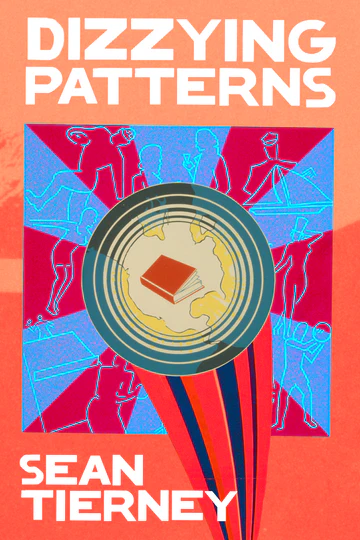
Twenty seven poems about the comfort of failure and confusion. From the dizzying patterns, where a dream’s fingers interlock with reality’s and logic falls in the deep end, thrashing to survive, you see something you think you know, but it’s all… watery. Recognizable, but a total mystery.
The last seven poems in this collection, subtitled CIRCLE I-VII, serve as the chapters of an experimental story about the weird place where a racing, waking mind drifts off. Written in the wet language of another world. One we all speak at night, jot down in dream journals half asleep, toss in the trash after coffee… But I kept a few.
My Brother Died, I Think, Hayley Snyder
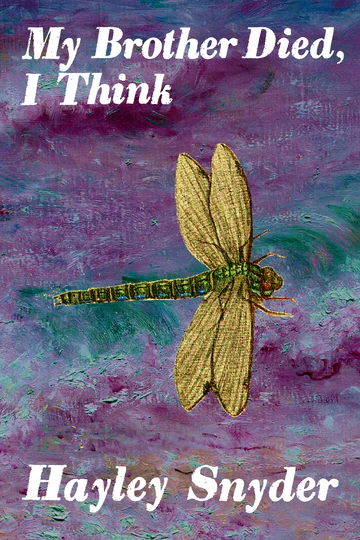
My Brother Died, I Think explores the aftermath of an unexplained sudden death and whether acceptance can be reached when answers never come. Moving through a patchy timeline of events, the author lets the reader in on what she knows of her brother’s final moments, which isn’t much. When so little is certain, reality borders on the subjective.
This prose poetry collection seeks to reckon with a grief shrouded in speculation and mystery, while the author attempts to vindicate her concrete memories of her brother against the enigma of his death. She is at points left wondering if there are some things better left unsolved. The author grapples with possibilities and hypothetical scenarios, stuck in the liminal space of unknowing.
An Oblique Voice, Matthew Schultz
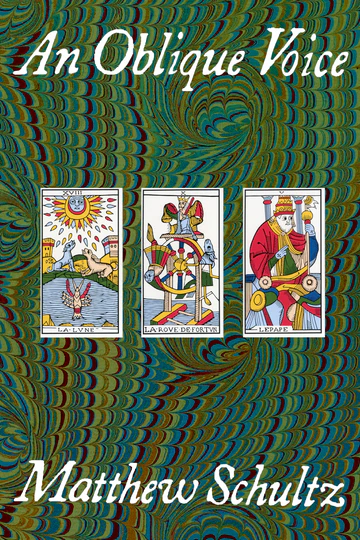
First, we detect a pattern. Then, we translate that pattern into words. In this collection of twenty-two poems, Matthew Schultz draws upon the images of Jean Dodal’s Les Tarots de Marseille (c. 1707) to attune his perception of place. For twenty-two consecutive days while sitting atop Observatory Hill on the campus of Vassar College in New York’s Hudson Valley, Schultz wrote a poem that ties together the images preserved on the cards and the images that played out in view of Sunset Lake and, further afield, the hills and mountains of the Hudson Highlands.
This collection plays with the appearance of the oracular as a haunting of images that sabotage reality. For Schultz, the oracular utterance generates aesthetic experiences that attune our awareness to the forms that construct reality. Once we have become accustomed to looking at the Tarot de Marseille, we can see visual rhymes everywhere. When the oracle claims its space in daily life, metaphor abounds: poetry becomes a lived experience.
The poem is a product of thought; poetry is a way of thinking. The tarot helps us to become more aware of the world around us. It attunes our perception to more vividly observe how this changes into that. Patterns emerge from such transformations/transitions. The tarot, therefore, expands the range of things we believe are worthy of our attention. And this is the essence of the poet’s work: to perceive with more than the senses and to articulate the connections between the visible and the invisible. Poetry, we might say, is the custodian of the oracular utterance.
To Be Hushed, Grace Delaney
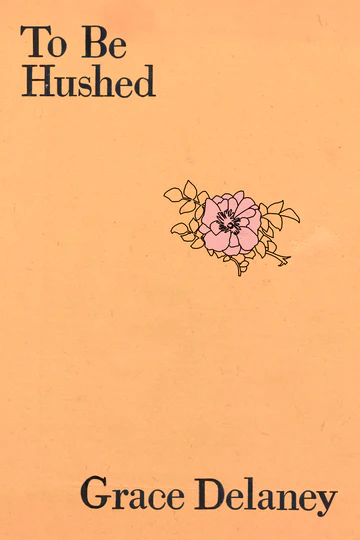
The chapbook To be Hushed is a free verse poetry collection that is a recollection of real feelings and moments that occurred during Gracie’s secretive relationship. The secretive nature of the relationship was due to the boy’s mother’s strong disapproval of Gracie for no logical reason. The mother went as far as to accuse the 19-year-old girl of being a pathological liar and threatened to harm both parties in the relationship. Gracie in her everyday life was well-liked by her peers. She was a school teacher, and college student and had a hard time coping with being outcast by her boyfriend’s family but was so in love she believed that hiding her relationship from the world was the answer. The problem with secret relations is that there is no accountability and no matter how much love there was shared between the couple there was always this feeling of facade. The relationship would hit peaks of feeling close to real but could never come to a pinnacle. Gracie had to take strenuous measures to keep her boyfriend a secret such as meeting in neutral locations and not sharing details of the relationship with her friends. Due to the pressure at home, her boyfriend suffocated his feelings and in turn, treated Gracie poorly in the relationship.
Gracie felt voiceless and felt that even though she poured her heart and soul into the relationship it was never enough. He crossed boundaries and made Gracie feel a wave of discomfort, hushing her from the world and refusing to listen to her voice. On Valentine’s Day, the boyfriend broke up with Gracie, leaving her with nothing but a pen and paper, so she wrote poetry to capture the moments in time and to harness the pain in art. It allowed her to see the beauty in being freed from such a toxic relationship and helped her seize her power back.
I’M SO BRIGHT AND LONELY TONIGHT, Casey Harloe
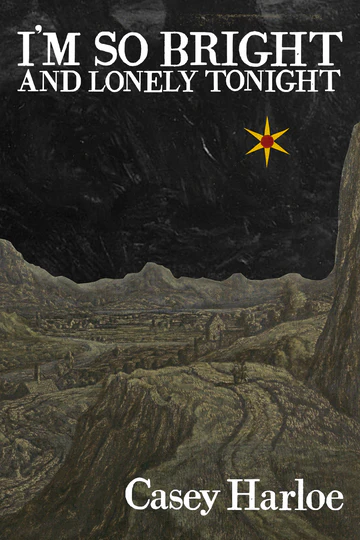
I’M SO BRIGHT AND LONELY TONIGHT is a search for something ultimately not there. Rooted in Midwest imagery, the author writes about boredom and stagnancy, pining a future ostensibly unobtainable but simultaneously fearful of its inevitable arrival. This is a collection about / for / based in Cincinnati- a city adored and scorned, an attempt to find equilibrium in their residency.
I’M SO BRIGHT AND LONELY TONIGHT addresses themes of romantic endeavors and their failures, complicated dynamics with the self, solitude. The way the world can be intolerable or unable to digest. Trying to cross sidewalks and clock in to reality, entertain the current projections, stimulate excitement even in the midst of quotidian mundanity.
This chapbook is a focus on absence, dwelling, analysis upon present circumstances, lacking tools necessary to alter the present and reform tendencies to exist skeptically, cautiously. Engage the reader in various modes of curiosity – what succeeds or fails to be present – what appears to disappear – what is worth our attention and what is best to abandon.
Around & Around, Ruth Ticktin
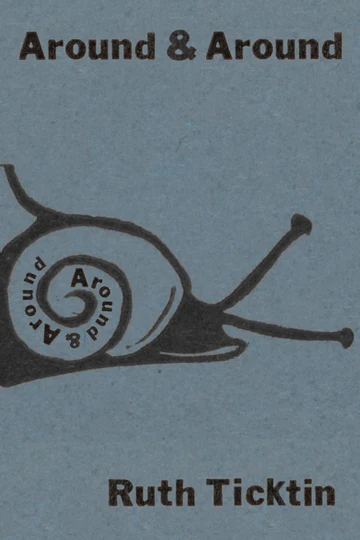
Around & Around is a chapbook consisting of twenty-six poems arranged into four sections: Stories; Surroundings; Selves; Seers. Stories reflect the lives of characters, both real and composites, encountered and created. The poetry includes stories of changes occurring in places and people.
In Surroundings, the poems look around us at hope, mist, masks on the wall, nature spirits, enfolding drama from dreams and a lyric ode to our sun. Delving into Selves, there are poems on games, action, positions, our fate, and our land. Alone or not, the poems beg the question, how can living beings make sense of where we’re at?
Seers is an exploration of six deceased heroes in conversation with the poet. They include an artist, union organizer, Native American heroine, musician, dancer, and biblical character.
Uninvited Guests, Maysoon Saeed
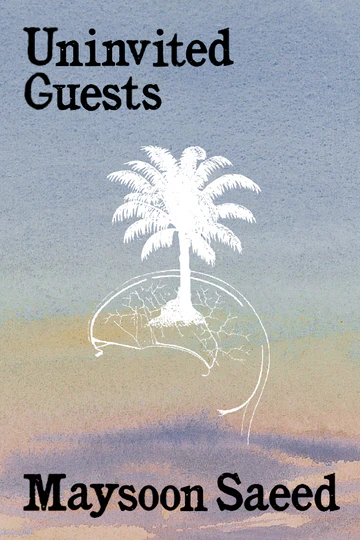
Maysoon Saeed’s debut chapbook Uninvited Guests is a collection of lyrical and thought-provoking poems divided into two distinct parts. The first delves into the metaphorical uninvited guests that occupy our minds, such as grief, anxiety and uncertainty. The second part takes a literal approach, offering insights from the perspective of an Arab Muslim immigrant navigating life in America.
As a talented bi-lingual storyteller, Maysoon seamlessly weaves together English and Arabic references, providing readers with a unique blend of Eastern and Western cultures. Uninvited Guests is an essential read for those eager to embrace multi-cultural and diverse voices.
Where I Sit, How I Stand, Sarah White
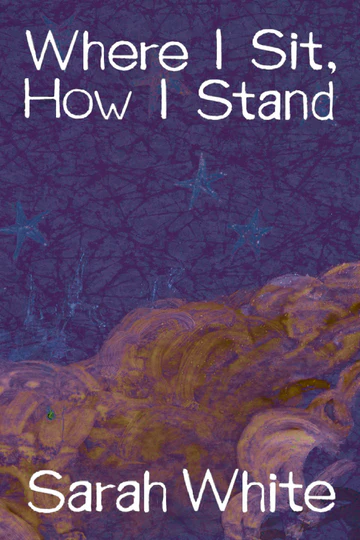
In such a vast world, where we sit shapes our perspectives and everyday outlook on life. How we stand and speak up for ourselves equally forms the person we become. Where I Sit, How I Stand addresses Sarah’s relationships with herself, society, the natural world around her, and her place in the universe. Parade through the desert into the sea, all the way up to the limitless galaxy that’s too easily forgotten.
Accompanied by sketches from Sarah, these poems will whisk you away as fast as the undertow in “The Real Danger.” This collection’s tone shifts from sarcastic to contemplative, much like Sarah’s inner thoughts. Join her and ponder your place in the universe.
Buried Paper Airplanes —And You, Maya Collins
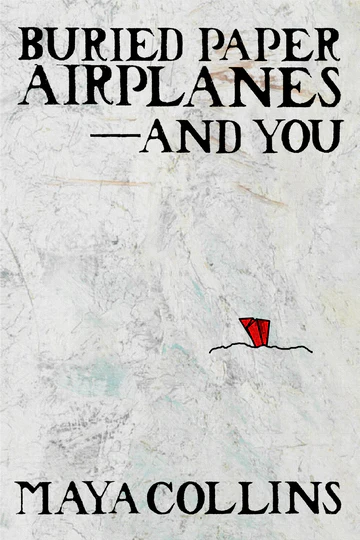
Snow-covered roadkill and the eating of groceries are fragments of grief and longing in this chapbook, Buried Paper Airplanes —And You. A candid exploration of mental illness and womanhood reminds the reader of works by Shira Erlichman. Richard Siken’s marriage of the holy and the mundane is paired with Annie Dillard’s powerful metaphor. Coming of age and the human psyche are explored within chosen moments, intense and vivid. The work is an immersive experience that engages the senses, uncovers wounds—and offers a shining sliver of hope.
A young woman’s confessional narrative takes its shape in old minivans, hospital waiting rooms, and childhood bedrooms. In the midst of isolation, a thread of longing is woven into moments, sifted through like photographs. The poet longs for the friend, embodied in an imagined somewhere, a dream of home. Ultimately, paper airplanes crafted from children’s coloring sheets reflect a belief in the ability to fly beyond hospital walls into a future of belonging and togetherness.
Black Liquorice on the Rocks, Ken LéMarchand
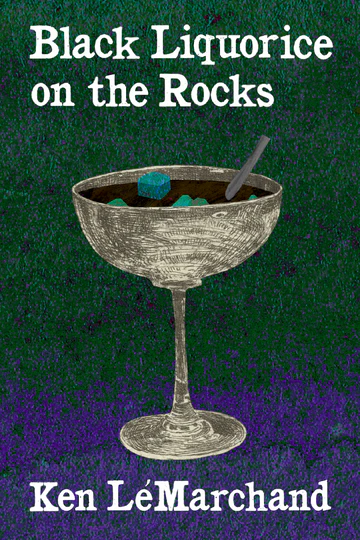
Black Licorice On The Rocks is a poetry collection with a bite. Like its namesake drink, these poems offer a bracing exploration of life’s realities, both sweet and sour. Dive into heartbreak, loss, and self-discovery with a touch of whimsy, celebrating resilience along the way.
Fresh metaphors and pop-culture winks challenge your perspective, revealing beauty in the overlooked. Whether it’s a blossoming love or a darkly funny heartbreak, Black Licorice On The Rocks leaves a unique aftertaste that lingers.
Organic Soup, LB Sedlacek
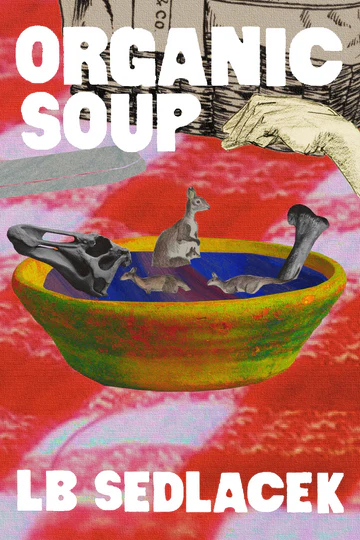
Organic Soup combines a variety of original themes and subjects to create a mixture of poetry. It is a literary concoction that simmers with life’s essential and rich ingredients. Using a pen instead of a spoon or fork, these poems cook up a savory blend of thoughts, feelings and every day observations. Flavors include dinosaurs, musicians, actors, animal balloons, firemen and poets, purple bricks and the sun and so much more.
This collection serves up a simmering feast of melded spices of humanity, existence, and nature which when blended together offers up a nourishing meal for the heart and soul. Touches of wit, lyrical prose, a bit of wisdom and insight make this collection something to savor. Sit down and sit back and relax and devour this book full of sustenance for the spirit.
Hymns for a Screech Owl, Jared Salyers
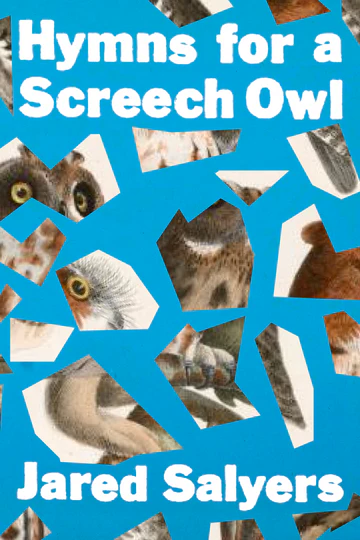
As tender and as fierce as the Appalachian hills they come from, the poems within Hymns For A Screech Owl navigate the tensions that arise between the past and the present, the mythic and the mundane, between memory and experience. Full of prayer, flood-swollen creeks, broken relationships, and new life, the poems that comprise this collection chronicle the ways in which the truths that shape a life are made.
In Hymns For A Screech Owl, Jared Salyers offers up poems sharp in both narrative and image that take their reader on a journey to the dead center of the heart – and to the unseen things that often come to roost in its rafters.
LAVA!, Marshall Woodward
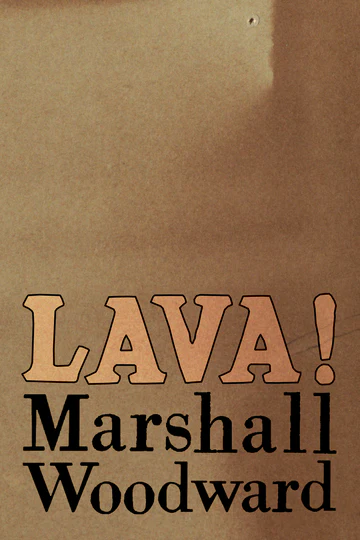
LAVA! is a long poem dealing in geology, grammar and the erotic. Its language is ground in soils, clays and marble statues, asking how the world passes and how we might take it back. In its broken lines are a declined Roman empire, the French Pyrenees and the carved rocks of the old world that found their way to New York’s Met Cloisters. It is lunar and terrestrial, subaltern and very much on the surface.
In LAVA!, repetition, rebirth and transformation are layered against the sediment of rocks and minerals across episodic eruptions. Grammar becomes the fertile ground through which love is lost, found, impressed upon us. LAVA! gives readers a rhetoric of romance alongside affirmations of love. The poem takes place over eons and the instantaneous, and is really about one thing and only one thing – is there a love, a poem, inside?
Earthquake Warnings, Alexandra Fleder
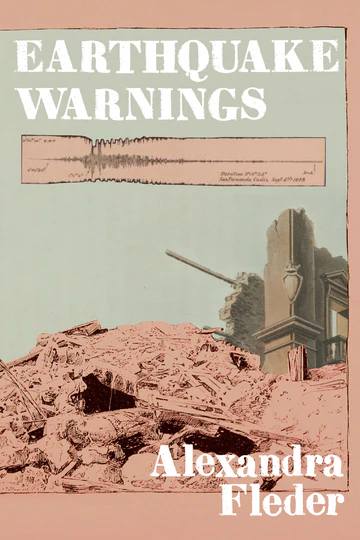
Earthquake Warnings describes a summer in Los Angeles when the sun was stalled, stripped of its kerosene rudder by a man-made force.
It’s a reaction to a time when the poles could spontaneously reverse, the heavens could unfold and release an asphyxiating dust, or earth could crack open and swallow you up—into a vortex or portal, maybe a star-gate or black hole.
Then you might be propelled into a spiraling critique of how your life turned out.
It’s a kind of reckoning—how you make sense of the past, and reshape it into something glimmering, free of all fallacy and made fresh into tendrils of hope that emanate from the heart like a flashing beacon, a resonance that reaches it target and detonates into authenticity and meaning, leading to a life of honesty and devotion.
Prisms, Eden Arielle Gordon
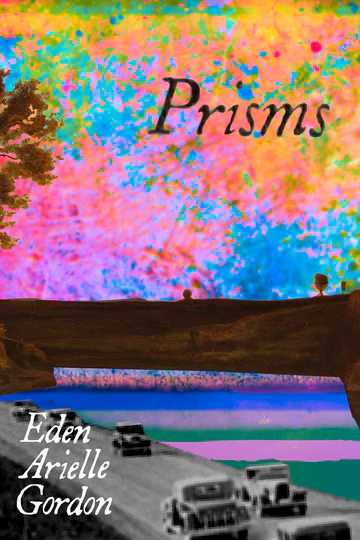
Traversing the sacred and profane, the ecological and prophetic, and the real and imagined, Prisms embarks on a journey from New York to California and back again. Written over the course of three years, these poems trace the evolution of both an individual and the collective amidst the seismic shifts of the 2020s while exploring the many deaths and rebirths we all must undergo as we move through time.
These poems traverse cross-country road trips, talking Joshua trees, cosmic cafes, now-defunct San Francisco artist collectives haunted by the ghosts of 1960s idealism, and other mystical, sometimes violent aspects of the American landscape. Climate change and signifiers of decay flicker through it all, emphasizing the inevitability of change while also noting that the nature of this change is not yet fixed.
Blurring the binaries between humans and nature and searching for connection in an impossibly scattered universe, the poems invoke Allen Ginsberg and Joy Harjo as they slip in and out of time, recalling our interconnected nature only to forget it again. Amidst it all, Prisms splices in hints of the transcendence that exist in the cracks when we stop for a moment — the winks of stillness, eternity, and recognition that punctuate our long drives home.
Don’t see a poetry chapbook published between 5/1 and 5/31 here? Contact us to let us know!

Contents
Check out new poetry books published the week of 5/7 from Stanchion Books, Black Ocean, Andrews McMeel Publishing, Picador UK, Mercer University Press, Wave Books, Alice James Books, Graywolf Press, Copper Canyon Press, BOA Editions Ltd, Black Lawrence Press, Grayson Books, Bloodaxe Books and CavanKerry Press.
Chapbook Poem: Disguise by Christine Kitano
Read the featured Chapbook Poem of the Month for May 2024, “Disguise” from Dumb Luck & other poems by Christine Kitano, along with a few words from the poet.
Check out new poetry books published the week of 5/14 from Finishing Line Press, Black Ocean, University of Queensland Press, She Writes Press, White Pine Press, Curbstone Books, New Directions, W. W. Norton & Company, Omnidawn, NYRB Poets, Anvil Press and an editor’s pick from Copper Canyon Press.
Check out new poetry books published the week of 5/21 from Seren, Finishing Line Press, Diode Editions, Copper Canyon Press, Nightboat Books, Milkweed Editions, CavanKerry Press, Invisible Publishing, Holy Cow! Press, Wake Forest University Press, Zephyr Press, Querencia Press, YesYes Books, Coach House Books and Rose Books.
Check out new poetry books published the week of 5/28 from Tupelo Press, Diode Editions, McSweeney’s Publishing, Michigan State University Press, Caitlin Press Inc., Carcanet Press Ltd., White Pine Press, Deep Vellum Publishing, Hat & Beard Press, Farrar, Straus and Giroux, Copper Canyon Press, Sagging Meniscus, The Song Cave, Finishing Line Press and Broken Sleep Books.
Check out new poetry books for the week of 6/4 from Bored Wolves, Scribner, Coach House Books, House of Anansi Press, Biblioasis, Button Poetry, Seagull Books, Jackleg Press, Green Linden Press and Central Avenue Publishing.
Chapbook Poem: Like a Honeypot by Stefanie Kirby
Read the featured Chapbook Poem of the Month for June 2024, “Like a Honeypot” from Fruitful by Stefanie Kirby, along with a few words from the poet.
Check out new poetry chapbooks from Cathexis Northwest Press, Diode Editions, Gnashing Teeth Publishing, Seren Books, Grayson Books, Querencia Press, Ugly Duckling Presse, The Poetry Box and Finishing Line Press.
Check out new poetry books published the week of 6/11 from The Poetry Box, Finishing Line Press, YesYes Books, Burnside Review Press, Row House Publishing, Deep Vellum Publishing, Farrar, Straus and Giroux, Phoneme Media, Sheila-Na-Gig Editions, Harvard Ukrainian Research Institute, Lynx House Press, Alice James Books and Inhabit Media.
May/June ‘24 Editor’s Note: Aldon Lynn Nielsen
While PCR contributors C.M. Crockford, Drishya, and myself work on reviews for our fourth issue and beyond, our May/June issue only has one editorial feature– the first in what I hope to be a series of long interviews with veteran poets.
A Conversation with Aldon Lynn Nielsen
Poet-scholar Aldon Lynn Nielsen shares about his work, his recent chapbook, and poetry in general in this collaborative interview piece with editor Aiden Hunt.
Check out new poetry books published the week of 6/18 from Finishing Line Press, YesYes Books, Belle Point Press and Red Hen Press.
Check out new poetry books published the week of 6/25 from Finishing Line Press, Nightboat Books, Coach House Books, Pavilion Poetry, LSU Press, Trio House Press, Leapfrog Press, White Pine Press, Carcanet Press Ltd., Dial Press, Milkweed Editions, and Farrar, Straus and Giroux.
